Management
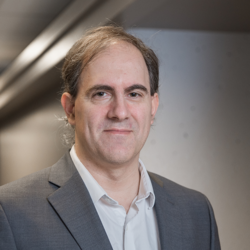
Santiago Hidalgo
Director
Santiago Hidalgo is assistant professor under grant in the Department of Art History and Film Studies at the Université de Montréal. He is the director of Laboratoire CinéMédias (since 2018) and executive director of the cinEXmedia partnership, "Contributing to well-being in the age of screens", focusing on the societal, pedagogical and therapeutic challenges of the cinematic experience from an inclusive perspective (2022-2029). In 2019, Hidalgo co-founded the Cinema and technology collection at Amsterdam University Press, as well as Cinéma et technologie at University Press in 2021. He still co-directs both collections. He is currently a researcher at the Centre de recherche de l'Institut universitaire de gériatrie de Montréal and the Centre d'études avancées en médecine du sommeil, and co-leader of the inclusive media training program at the PRAXIS Centre de développement professionnel.
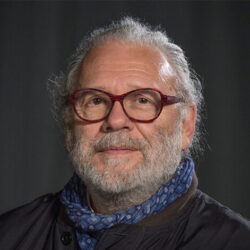
André Gaudreault
Founder
A well-known historian of early cinema and a pioneer in film narratology, in his current research André Gaudreault is especially interested in the advent of editing, in the phenomenon of opera broadcasts in movie theatres, in technological innovations seen from an “archaeological” perspective and in the impact of the digital on the media universe. He is one of the five founding members of the International Society for the Study of Early Cinema (Domitor), which he led, as the first elected president, from 1985 to 1994. In 1992 he founded, and has led since, the Groupe de recherche sur l’avènement et la formation des institutions cinématographique et scénique (GRAFICS); from 1997 to 2005 he was also head of another interdisciplinary and inter-university research infrastructure based at the Université de Montréal, the Centre for Research on Intermediality (CRI), of which he was one of the four founders. In 2010, at the Université de Montréal, he founded with the filmmaker and producer Denis Héroux the Observatoire du cinéma au Québec (OCQ), a unique scholarly crossroads whose goal is to promote exchanges between film practitioners and theorists. He is also the director and one of the founders of the International Research Partnership on Cinema Techniques and Technologies (TECHNÈS), which since 2012 has brought together eighteen partners and forty-five researchers from various countries whose goal is to reintroduce the technical element into scholarly thinking about cinema in order to better understand technological change and its interactions with film theory, aesthetics and practices. In 2016, he founded the Laboratoire CinéMédias, an infrastructure attached to the Canada Research Chair in Film and Media Studies, which encompasses, in addition to TECHNÈS, GRAFICS and the OCQ, the Programme de recherche sur l’archéologie et la généalogie du montage/editing (PRAGM/e).

Thomas Carrier-Lafleur
Research Coordinator
A post-doctoral researcher and part-time instructor at the Université de Montréal, Thomas Carrier-Lafleur is Research Coordinator at the Laboratoire CinéMédias. In 2019, he published the essay Il s’est écarté: Enquête sur la mort de François Paradis (Nota bene, with David Bélanger) and co-edited the anthology Impression, projection: une histoire médiatique entre cinéma et journalisme (Presses de l’Université Laval, with Richard Bégin and Mélodie Simard-Houde). He is also the author of L’oeil cinématographique de Proust (Classiques Garnier, 2016) and Une philosophie du “temps à l’état pur”: l’autofiction chez Proust et Jutra (Vrin/Presses de l’Université Laval, 2010). His work on intermedia focuses on literature in France and Quebec and on Quebec cinema.
Administration
Rémy Besson
TECHNÈS Scholarly Coordinator
A research professional and Scholarly Coordinator of the TECHNÈS International Research Partnership, Rémy Besson holds a doctorate from the EHESS (Paris), supervised by C. Delage, on the narrative form of the Claude Lanzmann film Shoah. He has worked as a post-doctoral intern at the Centre for Intermedial Research in Arts, Literatures and Technologies (CRIalt, Montreal, 2012-14), where he was scholarly coordinator of the international project Archiver à l’époque du numérique, and then at LLA-CREATIS (Toulouse II, 2014-15), where he continued his studies on intermediality. A recognised specialist on the relations between history, the humanities, digital culture and cinema, he is also a part-time university instructor. A list of his publications is available online: http://remybesson.blogspot.ca/
Rosalie Carignan
Audiovisual production coordinator
Rosalie Carignan completed a master's degree in cinema at the Université de Montréal in 2023 under the supervision of Bernard Perron. Rosalie is interested in issues of representation, genre film and feminism, with a marked sensitivity to questions of "race" and queer politics. Their thesis consequently focused on cinematic horror and social justice in the era of Black Lives Matter and #MeToo. Rosalie joined the Laboratoire CinéMédias team in 2021 as a technical assistant for the Laboratoire’s audiovisual production and post-production, contributing most notably to the activities of the Observatoire du cinéma au Québec. Rosalie is now in charge of the Laboratoire’s audiovisual section, and assists in the coordination of the Laboratoire CinéMédias' team.

Zoey Cochran
Co-director of the "Convergence through rhythm" theme of the cinEXmedia partnership
Bio to come

Tara Karmous
Coordination Agent of the Canada Research Chair in Film and Media Studies
After completing a master's degree in film research and creation under the direction of Olivier Asselin, Tara Karmous became the coordinating agent of the Research Chair in Film and Media Studies. Her studies focused on the use of geolocation and augmented reality in an activist perspective. As part of the Lab_Artenso, she continues her reflection with the creation of a prototype entitled La fin des paillassons, an augmented reality project inviting to revise the patriarchal discourse in art history. Since 2021, Tara has also been a research assistant on the OpéRA de Poche project, which aims to create operas for augmented reality and virtual reality to document the research-creation process.
Communications
Marnie Mariscalchi
Publications Manager
Marnie Mariscalchi is a research advisor at the Université de Montréal and, since 2019, publications manager at Laboratoire CinéMédias. She was successively distribution coordinator, editorial secretary, then managing editor of the film studies journal Cinémas, for which she has worked from 2007 to 2024. At the same time, she collaborated on several research projects, mainly within the framework of GRAFICS, as a research assistant, editorial assistant and coordination assistant. She studied cinema and art history at the Université de Montréal.
Olivier Du Ruisseau
Communications manager for the cinEXmedia partnership
Olivier Du Ruisseau holds a Bachelor of Fine Arts (BFA) with a double major in Art History & Film Studies and Journalism from Concordia University. He works in both the media and the cultural milieu, while completing his Master's degree in Film Studies at Université de Montréal under the direction of André Habib. Reporter, arts journalist and film and visual arts critic, he works for the daily newspaper Le Devoir and contributes to Médiafilm, among others. He has also held a number of positions at various film festivals, including programmer at the Festival International du Film sur l'Art (FIFA), and editor for the Festival du nouveau cinéma. He also works at the Cinéma sous les étoiles festival, and is a member of the FIFA pre-selection committee. His recent research focuses on the contribution of festivals to critical and academic discourse on québécois cinema.
Technical Support and Audiovisual Production
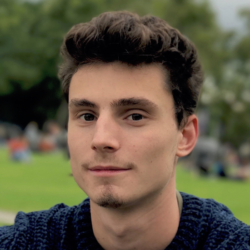
Thomas Rapenne
Audiovisual Production Assistant
Thomas Rapenne has been a master’s student in cinema studies at the Université de Montréal since September 2018, working under the supervision of André Gaudreault. His research and creations focus on images of graphic interfaces (mainly computers and smart phones) in cinema. He is in charge of post-production for the International Research Partnership TECHNÈS and holds a bachelor’s degree in the performing arts, with a specialisation in images, from Université Lyon 2 (France).

Hiba Chaari
Audiovisual production assistant
Bio à venir
Research Professionals

Pierre Chemartin
Pierre Chemartin is a researcher, film critic and part-time university instructor in cinema studies. His work focuses on the graphic novel and animated cinema.

Alex Delagrave
Project Manager, Digital Collections
Alex Delagrave holds degrees in cinema studies (Concordia University) and information sciences (Université de Montréal). His work is oriented towards audiovisual archives, with a pronounced interest in issues around dissemination. At the Laboratoire, he is involved in research and valorisation projects which call on his fields of expertise: managing digital collections, designing metadata structures, document handling and analysis, and digital publishing. He is involved in particular in the creation of TECHNÈS’ digital encyclopaedia and is working on a project of video annotation of filmed interviews. He also contributes to organising virtual conferences and works as a programmer and projectionist and leads creative workshops for several cinema organisations and groups.
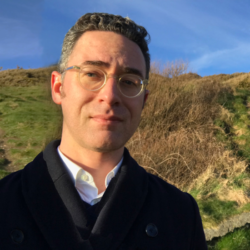
Louis Pelletier
Louis Pelletier holds a doctoral degree in communication from Concordia University, is a research professional and a part-time instructor at the Université de Montréal, where he also completed a postdoctoral research project funded by the Social Sciences and Humanities Research Council of Canada on the earliest experiences in the production of fiction films in Quebec. He is also researcher in residence at the Cinémathèque québécoise, scholarly coordinator of the Canadian Educational, Sponsored and Industrial Film Project at Concordia University and co-director of Nouvelles vues. He has published on silent cinema, industrial cinema, amateur cinema, film exhibition, the technological history of cinema and avant-garde cinema in Film History, 1895, The Moving Image, The Journal of Film Preservation, the Canadian Journal of Film Studies and Found Footage. He is currently finishing the manuscript of a book on film distribution and exhibition in Montreal from 1912 to 1952.
Postdoctorant-e-s
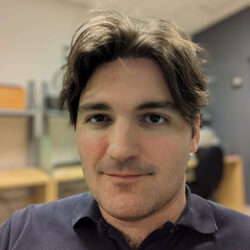
Baptiste Creps
Post-doctoral Researcher
Baptiste Creps is a postdoctoral researcher and lecturer at the Université de Montréal. He specializes in the history of cinematographic forms, particularly Hollywood, film music, and the notions of classicism and neoclassicism in art history. His research and publications also focus on the study of digital technologies, media, and video games from an intermedia perspective. He has previously taught at the Université Gustave Eiffel, the Université Rennes 2 and the Institut Catholique de Paris.

Caroline Martin
Post-doctoral Researcher
A post-doctoral researcher (FRQSC, 2020-22) at the Laboratoire CinéMédias, Caroline Martin has worked as a part-time university instructor in literature and cinema for more than 15 years. She has a master’s degree in arts and literature (UQAM) and a doctorate in arts education (Concordia University). In 2018, students voted her one of the five most inspiring instructors at the Université de Montréal. Her research interests include film and media education, film reception by young audiences and audio description. In collaboration with OEIL cinéma (Outil pour l’Éducation à l’Image et au Langage CINÉMAtographiques), she carries out research across Quebec among secondary school teachers who use cinema in their curriculum. She is currently the representative of part-time instructors in the Département d’histoire de l’art et d’études cinématographiques (Université de Montréal) and is a member of the advisory committee on a series of courses on inclusive media at the Chang School of Continuing Education (Ryerson University).
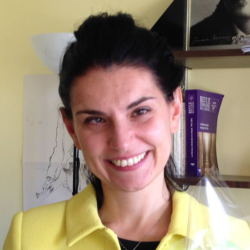
Claudia Polledri
Post-doctoral Researcher
A post-doctoral researcher and part-time instructor in the Département d’histoire de l’art et d’études cinématographiques (UdeM), Claudia Polledri holds a doctoral degree in comparative literature from the Université de Montréal which examines photographic depictions of Beirut (1982-2011) and the relations between photography and history. She was guest researcher at LLA-CRÉATIS (2016) and was scholarly coordinator at CRIalt (Centre for Intermedial Research in Arts, Literatures and Technologies) from 2015 to 2018. Her research interests include cinema and photography in the Maghreb and Middle East. She curated the photographic exhibition Iran: poésies visuelles, presented during the Rencontres internationales de la photographie en Gaspésie (2019).
Research Assistants

Robin Cauche
Doctoral Student
With a background in video editing, Robin Cauche first worked as the head of post-production for a television music video network. His research examines the history and aesthetics of illustrated songs. In particular, he has studied the Scopitones and lyric videos. A certified teacher of modern literature, he is also a part-time university instructor in literature and cinema studies. Cauche has been a doctoral student in cinema studies since 2016, under the joint supervision of Martin Barnier (Université Lumière Lyon 2) and André Gaudreault (Université de Montréal). His dissertation focuses on “illuminated written songs,” or those audiovisual forms which show on a screen the words to the songs they are illustrating, from magic lanterns to YouTube (19th – 21st centuries). He has been an associate researcher at the Cinémathèque Française (2016-17) and in 2018 received the DOMITOR Student Essay Award for his research into the industry’s illustrated song crisis in the United States in 1907-8.
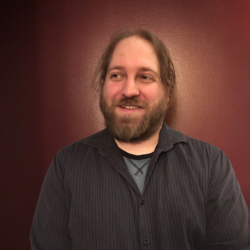
Louis-Philippe Hamel
Doctoral Student
A doctoral student in the Département d’études cinématographiques at the Université de Montréal since 2018, Louis-Philippe Hamel is preparing a dissertation on the stylistic specificity of science fiction in an age when digital special effects have become standard practice. His work is being supervised by Richard Bégin, who had also supervised his master’s thesis, which examined the influence of the concept “cool” on the crime film genre in the 1990s. His current research focuses on digital cinema, visual (and special) effects and science fiction—and on peripheral issues, which he explores in particular by way of conference papers such as that on the recognition and organization of work in the field of visual effects, which he presented in 2019 at the TECHNÈS conference “Gestes singuliers, gestes collectifs: histoire et cinéma en pratiques.”
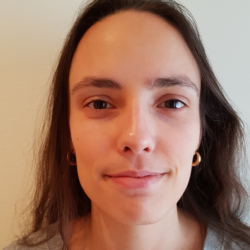
Frédérique Khazoom
Doctoral Student
Frédérique Khazoom completed her master’s degree at the Université de Montréal under the program “International Master of Audiovisual and Cinema Studies,” which led her to visit renowned institutions in Europe, such as Université Sorbonne Nouvelle Paris III (France) and Universiteit van Amsterdam (the Netherlands). Her work focuses on the way in which the different spheres of the contemporary television landscape adapt to the changes brought about by the convergence of the Internet and television. For her doctoral project, she is attempting to understand how the possibilities of the online platform Netflix affect the way it addresses television viewers and the way in which viewers experience television as members of a now global audience. She also works with Labo Télé (Université de Montréal), led by Marta Boni since 2018.
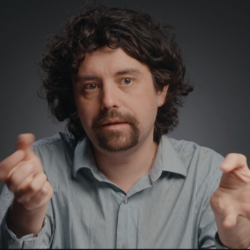
Simon Laperrière
Doctoral Student
Simon Laperrière is a doctoral student in cinema studies under the supervision of Richard Bégin. His current research focuses on fan theories, popular culture and over-interpretation. With Eric Falardeau, he co-edited the anthology Bleu nuit: Histoire d’une cinéphilie nocturne (Somme toute, 2014). In 2018, he published Series of Dreams: Bob Dylan et le cinéma with Éditions Rouge Profond. A contributor to the audiovisual project Zoom Out, he has also written a variety of articles for Hors champ, Spirale and 24 images, and participates regularly on the broadcast Plus on est fous, plus on lit (Ici Première). With Simon Lacroix, he co-directs the series of oddball screenings Les nuits de la 4e dimension at the Cinéma du Parc.
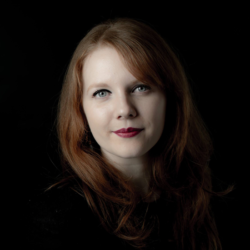
Alice Michaud-Lapointe
Doctoral Student
Alice Michaud-Lapointe is a doctoral candidate in the Département d’études cinématographiques at the Université de Montréal and a part-time university instructor. Her dissertation examines the connections between cinephilia and the concepts of haunting and memory in contemporary cinema. She is a member of the editorial board of the cultural magazine Spirale, for which she co-edited with André Habib a thematic section on “Le temps du rétro.” In addition to her criticism published in Spirale, her work has been published in the journals and magazines Liberté, Études Françaises, Found Footage Magazine and Nouvelles Vues, and on the platforms Mise au point and Hors Champ. She is also an author of fiction, having published with Éditions Héliotrope a book of short stories (Titre de transport, 2014), a novel (Villégiature, 2016) and a travelogue (Néons et sakuras, 2018). She has been a research assistant at GRAFIM since 2019.
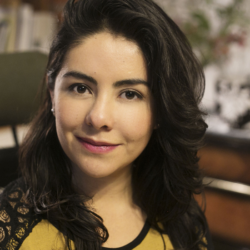
Katia Andrea Morales Gaitan
Doctoral Student
Katia Andrea Morales Gaitan is a doctoral student in cinema and media studies and administrative assistant for the Programme de recherche sur l’archéologie et la généalogie du montage/editing (PRAGM/e). She obtained a master’s degree with honours in documentary film at the Universidad Nacional Autónoma de México (UNAM), which granted her the Alfonso Caso medal in 2018. As part of her master’s degree studies, Katia undertook a research sojourn in the faculty of engineering at the Universidad del Desarrollo in Santiago, Chile. She holds a bachelor’s degree in sociology from the Universidad Autónoma del Estado de México (UAEMex) and took part in an academic exchange with Université Lyon Lumière 2, France. She headed the research project “The State of Audiences in Mexico’s Cultural Circuit” at the request of ProcineDF. Katia has taught documentary film production and history and collaborated with several institutions, such as the Cineteca Nacional, UNAM and Universidad Iberoamericana. In 2014, she worked as coordinator for FilminLatino, IMCINE’s VOD platform. A member of the coordination team for the conference Latin Side of the Doc 2013, she has contributed to the development of the Ouishare community, in addition to leading workshops for the Inter-American Development Bank (IADB).
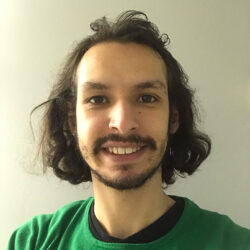
Marwan Saad
Master's Student
After completing a bachelor’s degree in history, a major in cinema studies and a minor in communication sciences, in 2020 Marwan Saad began work on a master’s degree under the supervision of André Gaudreault on streaming platforms and their effect on movie theatres. His fields of interest centre on film history, technological development and digital technology in cinema.

Alice Guilbert
Master's Student
Straddling Canada and France, Alice Guilbert studied art history and archaeology in Paris at Université Panthéon-Sorbonne before returning to Montreal to undertake a bachelor’s degree in cinema at the Université de Montréal. She joined the Laboratoire CinéMédias in 2019 as a research assistant.
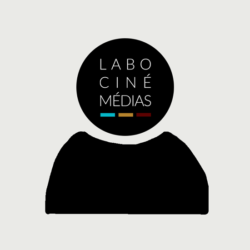
Lisa Melinand
Doctoral student
Lisa Andrée Mélinand, a doctoral student in film studies under the guidance of Santiago Hidalgo and a research assistant for Caroline Martin, is dedicated to enhancing accessibility and inclusion in cinema and media, with a particular focus on disabled, racialized, and LGBTQIA2+ individuals. As a racialized, neuroatypical, and non-signing oral deaf person, she brings a unique perspective to her research. Her studies in France led her to consider the concept of therapeutic, inclusive, accessible, and ecological cinema, which is at the heart of her doctoral thesis. She aims to create a streaming site tailored to the needs of audiences with disabilities. During her master's, Lisa became aware of the accessibility challenges in cinema, which motivated her to advocate for a more inclusive industry. She initiated a tutoring program at the University Paul Valéry Montpellier III, including educational video capsules and a day of projection-meeting with Dr. Jean Victor Leblanc, to discuss the role of cinema in representing psychological disorders. Lisa continues her research with determination, aiming to enrich cinema for everyone.

Tanzia Mobarak
Doctoral student
Bio à venir.

Romina-Soledad Romay
Doctoral student
Romina S. Romay is a composer, conductor and pianist of Argentinean origin, involved in creative work linked to new technologies, and frequently addressing themes relating to nature, the living and ecology. Initially trained as a pianist, she went on to study music composition at the Universidad Nacional de las Artes in Buenos Aires, Argentina. She obtained an international master's degree in contemporary music composition and performance at the Conservatoire National de Musique et de Danse de Lyon, with residencies in Estonia, Sweden and Germany, and then completed a doctorate in metadata-based microtonal music composition at the Université Côte d'Azur in Nice, France. As a research engineer for XR²C² (Extended Reality Research and Creative Center), she contributes to the realization of artistic residencies, study days and research projects in relation to VR, AR and MR applications.

Marianne Abi-Nahed
Master's student
Following the completion of her bachelor's degree in cinema, Marianne Abi-Nahed is currently pursuing her master's program in film studies at the Université de Montréal under the supervision of André Gaudreault. She joined the Laboratoire CinéMédias as a research assistant in 2022. Her research interests focus on film theory, aesthetics, cinematic language, and the psychological intricacies of storytelling.
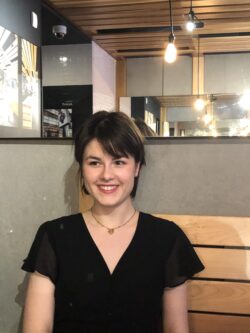
Lou Andrysiak
Master's student
Lou Andrysiak graduated with a bachelor's degree in French literature from the University of Montreal. During her studies, she was interested in notions like film adaptation, cultural and media practices and even publishing. Since 2022, she has been a research assistant for Thomas Carrier-Lafleur. Currently in the DESS in journalism, she has joined the cinEXmedia team to participate in writing articles for the website.

William Pedneault-Pouliot
Master's student
William Pedneault-Pouliot completed a bachelor’s degree in history and a certificate in art history in 2022 at Laval University, in Quebec City. He is currently working on his master’s degree at Montreal University in the International Master in Cinema Studies program, under the supervision of Prof. André Gaudreault. He is interested in cinema history from an interdisciplinary perspective, and more particularly in the links between cinema and the arts. His thesis will focus on the role played by the artists and writers of the avant-garde in the conceptualisation of cinema montage in France in the 1910s and 1920s. He is a research assistant at Laboratoire CinéMédias since 2023.
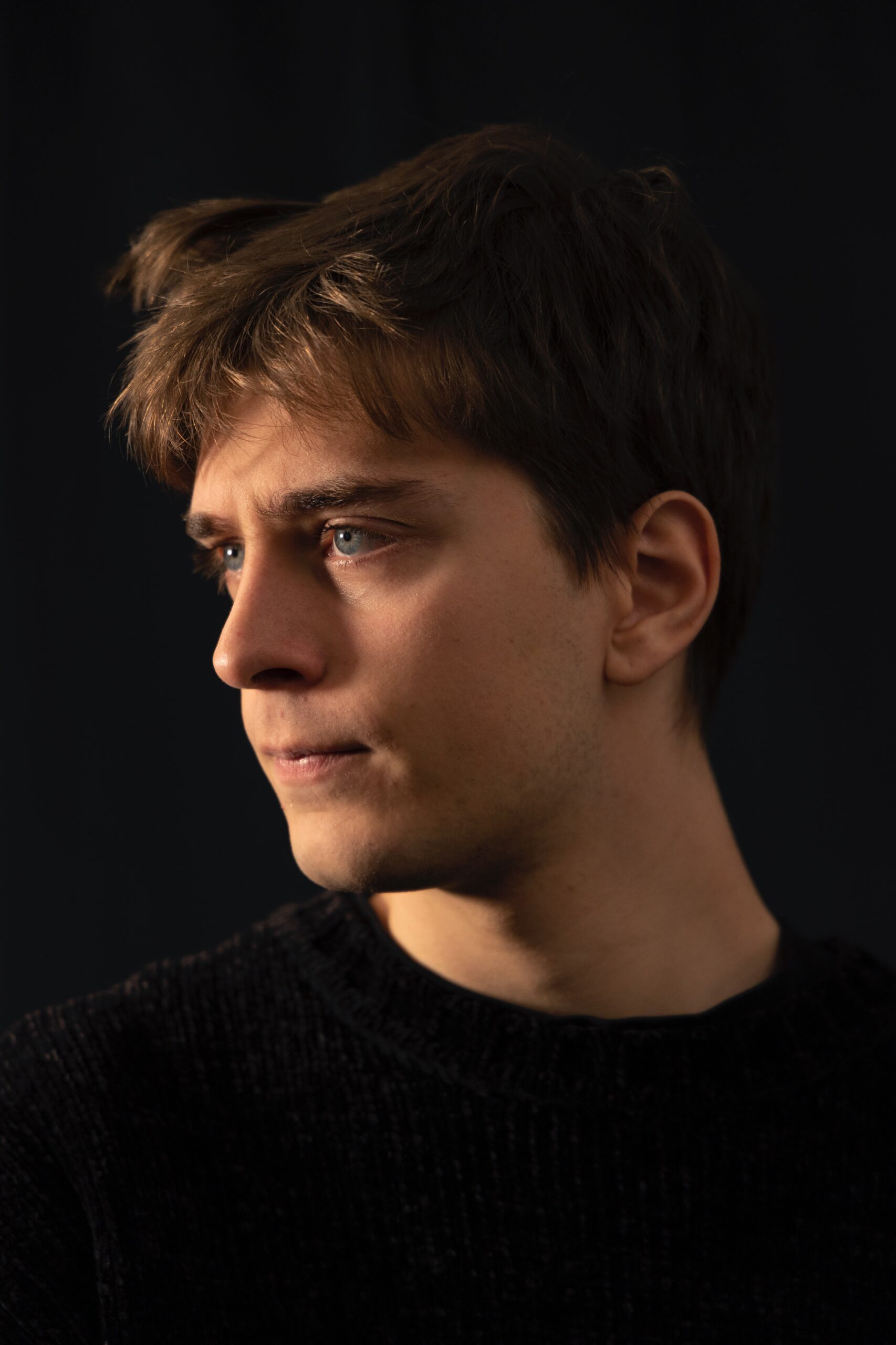
Hugo Samson
Baccalaureate student
Having completed a college diploma in cinema, Hugo Samson is now undertaking a bachelor's degree in comparative literature at the Université de Montréal. His interests include theories of intermediality and the intersection between art and politics in cultural spaces such as museums and theaters. For the Laboratoire CinéMédias, he writes articles for the website and assists the chairholder of the Canada Research Chair in film and media studies.
